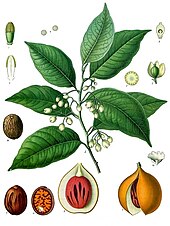User:Mhatopzz/Portuguese Empire in the Indonesian Archipelago
| Portuguese colonization era | |||
|---|---|---|---|
| 1512–1605 | |||
 Map from 1519 showing the islands of Indonesian Archipelago, with the Portuguese banner planted. | |||
| Location | Malay Archipelago, East Indies | ||
| Including | Portuguese–Ternate wars Aceh–Portuguese wars Demak–Portuguese wars | ||
| Leader(s) | Alfonso de Albuquerque António de Abreu Francisco Serrão | ||
| Key events | Age of Discovery | ||
Chronology
| |||
The Portuguese were the first Europeans to establish a colonial presence in the Indonesian Archipelago. Their quest to dominate the source of the spices that sustained the lucrative spice trade in the early 16th century, along with missionary efforts by Roman Catholic orders, saw the establishment of trading posts and forts, and left behind a Portuguese cultural element that remains in modern-day Indonesia.
Europeans were making technological advances in the early 16th century; new-found Portuguese expertise in navigation, shipbuilding and weaponry allowed them to make daring expeditions of exploration and expansion. Starting with the first exploratory expeditions sent from newly conquered Malacca in 1512, the Portuguese were the first Europeans to arrive in the East Indies, and sought to dominate the sources of valuable spices[1] and to extend their Roman Catholic missionary efforts. Initial Portuguese attempts to establish a coalition and peace treaty in 1522 with the West Javan Sunda Kingdom[2] failed, owing to hostilities among indigenous kingdoms on Java. The Portuguese turned east to Moluccas, which comprised a varied collection of principalities and kingdoms that were occasionally at war with each other but maintained significant inter-island and international trade. Through both military conquest and alliance with local rulers, they established trading posts, forts, and missions in the Spice Islands, including Ternate, Ambon, and Solor.
Arrival of the Portuguese[edit]

From Malacca to the Spice Islands[edit]
Construction of São João Baptista de Ternate[edit]
Monopolization of trade[edit]
Engagement of trade in Sumatra[edit]
Cloves from Maluku[edit]
Struggle with other European merchants[edit]
Relationship with local rulers[edit]
Peace treaty with Sunda Kingdom[edit]
Conflict with the Acehnese[edit]
Attempted domination over Java[edit]
Political interference in Ternate royal courts[edit]
Decline and fall[edit]
Prolonged war with the Aceh Sultanate[edit]
Expulsion from Java[edit]
Overthrown in Ternate[edit]
Dutch attacks on Ambon and Tidore[edit]
Legacy[edit]
See also[edit]
- Portuguese East India Company
- Indonesia–Portugal relations
- Portuguese loanwords in Indonesian
- Mardijker people
- Portuguese Indonesian
- Timeline of Indonesian history
- List of topics on the Portuguese Empire in the East
- Portuguese Timor
References[edit]
- ^ Ricklefs, M.C (1969). A History of Modern Indonesia Since c. 1300, second edition. London: MacMillan. pp. 22–24. ISBN 0-333-57689-6.
- ^ Sumber-sumber asli sejarah Jakarta, Jilid I: Dokumen-dokumen sejarah Jakarta sampai dengan akhir abad ke-16. Cipta Loka Caraka. 1999.;Zahorka, Herwig (2007). The Sunda Kingdoms of West Java, From Tarumanagara to Pakuan Pajajaran with Royal Center of Bogor, Over 1000 Years of Prosperity and Glory. Yayasan Cipta Loka Caraka.

